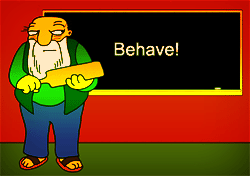Social Network Etiquette - Shelly Palmer Report

Excerpted from my upcoming book "Get Digital: Reinventing Yourself and Your Career for the 21st Century Economy" (Lake House Press, 2009)
We've already discussed the power of social networks for promoting your personal brand. However, it is important to never underestimate the potentially disruptive force social networks can wield. All it takes is one picture, one message, one inappropriate post to un-do a lifetime of resume building. Once again, there is absolutely no reasonable expectation of privacy online. Be mindful of who might see your profile: your boss, your colleagues, your clients, your friends, even your mother.
The first thing to consider when creating or updating your social networking profile is whether or not it is intended for personal or business use. It cannot be both. Make a choice and stick to it. Maybe you want to use Facebook as your personal profile and LinkedIn for your professional, totally fine. Just make sure you draw the line and stay on one side or the other. If you have a personal profile and want to keep it personal, use the built in security settings to make sure only people you choose and know can see the content. That does not mean that you can post whatever you want without consequence – there are many ways for a disgruntled "friend" to share the content of your profile with an unintended audience.
I know people who have falsely assumed that if their name isn't on something, they are impervious to digital catastrophe. Some people will use a version of their name so they can't be searched, but all it takes is for one person to recognize you and the game is over. If it has your picture, or any personal information, it can and will be traced to you. You are not deep throat – your identity will be known without too much trouble.
Be choosy with your friends. Don't ask for or accept a friend request from someone who is not really a "friend." If you don't know them, you don't know what they're capable of. Are they posting indecent material? Do they have racist or controversial views? Do they have a bad reputation? You can't be too careful. Besides, it's quality not quantity. Social networking is not a popularity contest. You don't get a prize for having the most contacts. In fact, when it comes to social networking, less is more. Your social network is only as strong as your ties to the people in it. You will get more from a close network of 50 friends than you will from a network of 500 people you barely know. The value of social networking is to leverage your contacts for referrals, business leads, new opportunities, etc. Only people who know you can help you. Also, just because you are friends with someone doesn't mean you will be friends forever. Take the time to occasionally review your friend list and get rid of people whose values and behavior don't align with yours. You don't want to be guilty by association.
Those of you who now feel obligated to search my name on Facebook and LinkedIn, go ahead. You can use shelly@palmer.net (on both social networks) to find me. If you try to friend me, and you're not a noted ax murderer, I will probably accept. That's not because I am not heeding my own advice. I use both accounts for business. Shelly Palmer, the person, does not ever visit a social network. Shelly Palmer, the brand, is on 24/7. You will see only what I want to present.
This is an important point. Pause before you post. Take a moment and consider what the content is and if it's appropriate for others to see. What's considered appropriate? A good rule is not to put anything up that you wouldn't want your mom or your boss to see. It's extremely important to understand how accessible this information is and besides those mentioned above, consider the reactions of your clients, colleagues, prospective employers, friends and family. If you have a question about something being appropriate, it is much better to err on the side of caution. Again, even if you have your profile set to private, there is no reasonable expectation of privacy on the Internet.
Many hiring managers like to look at the profiles of applicants on social networks. What you have on your profile could make the difference in getting the job or not. In 2008, CareerBuilder.com released a study that found one in five employers search social networking sites to help them with their hiring decisions. One third of those surveyed said they didn't hire someone because of what they had seen on a candidate's profile. One can imagine that as social networks become more prominent, this number will rise.
The study showed that the areas that were of most concern on social networking sites included:
- Information about alcohol or drug use (41% of managers said this was a top concern)
- Inappropriate photos or information posted on a candidate's page (40%)
- Poor communication skills (29%)
- Bad-mouthing of former employers or fellow employees (28%)
- Inaccurate qualifications (27%)
- Unprofessional screen names (22%)
- Notes showing links to criminal behavior (21%)
- Confidential information about past employers (19%)
Showing caution doesn't mean that you can't show your personality and have fun with your profile. Prospective employers also like looking at online profiles because it gives them a better sense of who you are – they find out more than they can by looking at your resume. In fact the study revealed that 25% of those who used social networks to look at a candidate ended up hiring the person because they liked what they saw! So, don't be afraid to use social networks they can help – just be mindful of your etiquette.
Shelly Palmer is the host of MediaBytes with Shelly Palmer, a daily show featuring news you can use about technology, media & entertainment. He is the author of Television Disrupted: The Transition from Network to Networked TV (2008, New York House Press) and the upcoming, Get Digital: Reinventing Yourself and Your Career for the 21st Century Economy. (2009, Lake House Press). Shelly is also President of the National Academy of Television Arts & Sciences, NY (the organization that bestows the coveted Emmy Awards). For information about Get Digital Classes, visit http://www.shellypalmer.com/seminars


